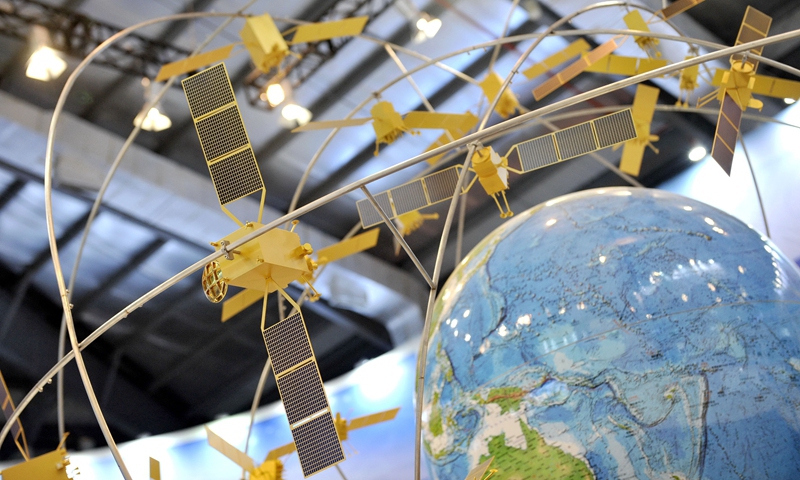
A model of the Beidou Satellite Navigation System (Photo: Xinhua)
China's homegrown BeiDou Navigation Satellite System (BDS), has been deployed in massive applications in various fields with daily average usage exceeding 600 billion times in 2023, according to an industrial report over the weekend.
BDS and the US-based Global Positioning System (GPS) are considered neck-and-neck, with similar navigation precision and satellite search capability, said Chinese space experts, noting that BDS even takes the lead over GPS in some specific areas.
The Global Navigation Satellite System (GNSS) and Location Based Services (LBS) Association of China on Saturday issued a white paper on the development of China's satellite navigation and positioning service industry, China Media Group reported on Saturday.
The report stated that the total output value of China's satellite navigation and positioning service industry reached 536.2 billion yuan ($74.23 billion) in 2023, up by 7.09 percent year-on-year.
Following rapid digital transformation of industries, market demand for BDS navigation and data transmission is rapidly expanding. In 2023, China's sales of devices equipped with BDS surpassed 400 million units, of which 276 million were smartphones.
Notably, multiple domestic navigation services providers have switched to BDS, with daily average usage exceeding 600 billion times last year, said the white paper.
The Chinese government has placed great emphasis on satellite internet connections, issuing a set of new policies supporting the industry's growth since 2021, according to Chinese industry analysis firm Taibo Research.
Wang Yuecheng, chief analyst of Taibo Research, told the Global Times on Sunday that BDS has vast application scenarios in China, exceeding the number of applications of GPS.
While the official launch of BDS was later than GPS, the large data volume generated in daily operation can rapidly improve the BDS, he said.
In December, China sent two new satellites for the BDS-3 into their orbits from the Xichang Satellite Launch Center in Southwest China's Sichuan Province. Now, the localization rate of BDS-3 satellite core components has reached 100 percent.
The high localization rate of BDS will strongly support independent development of China's GNSS despite the US' reckless suppression of China's high-tech sectors, Wang noted.
Global Times




















